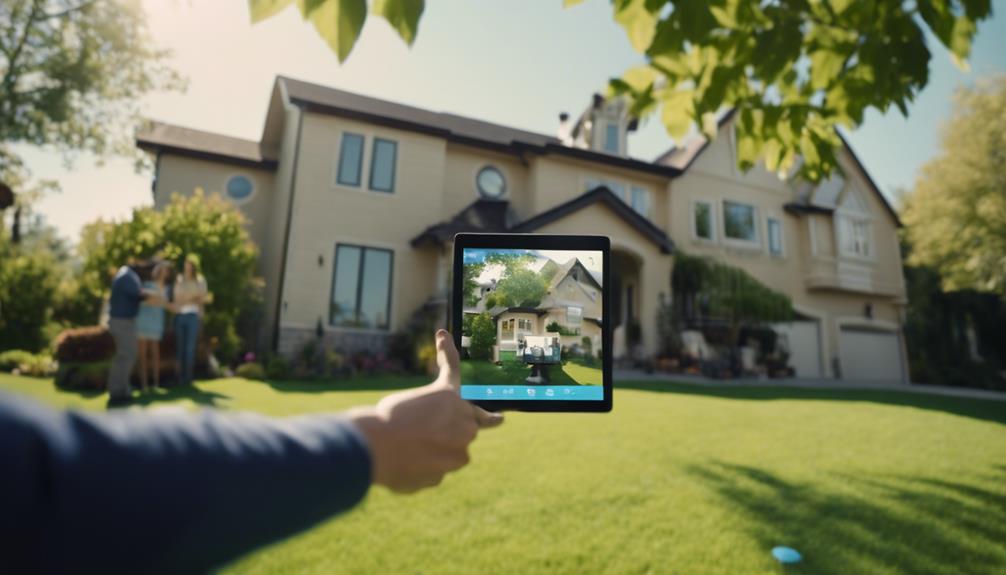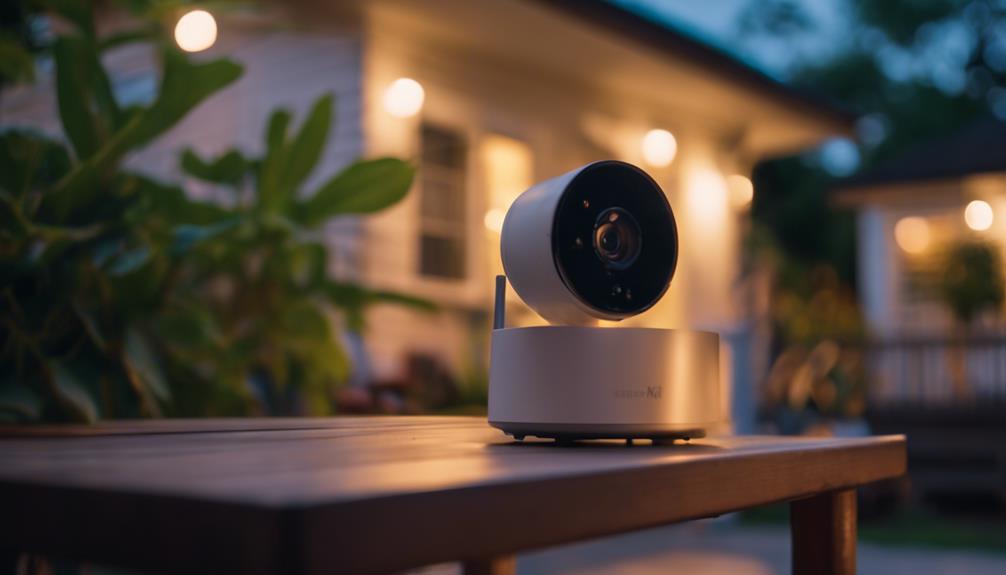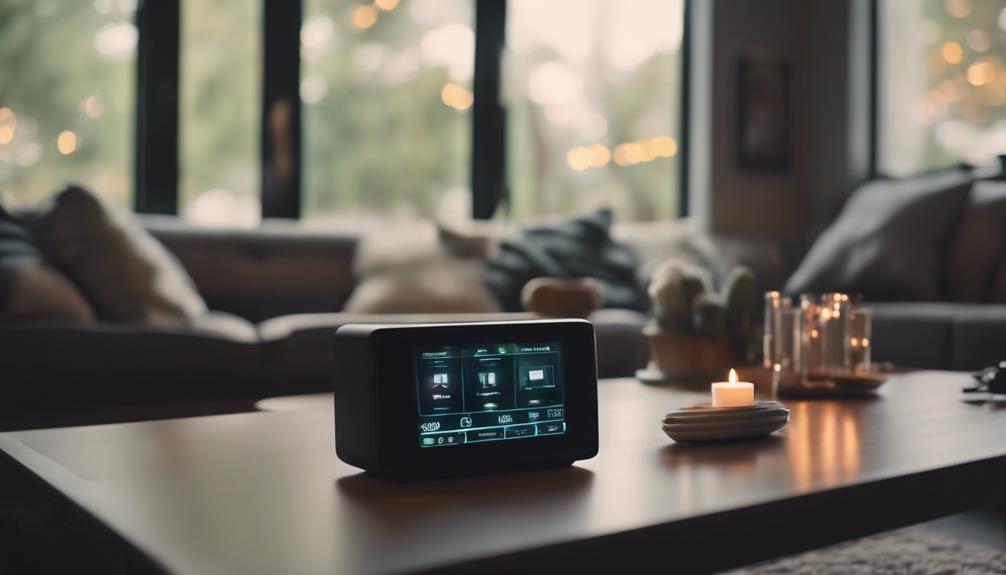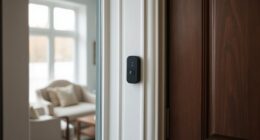To sell home security systems effectively, start by understanding the market's high demand, as 76% of Americans value safety. Identify your target audience and tailor your approach to their specific concerns. Use engaging sales techniques, including open-ended questions, to uncover unique security needs. Building strong customer relationships is essential, so prioritize personalized interactions and follow-ups. Maintain professionalism to enhance trust, showcasing your knowledge and credentials. Finally, educate prospects on system benefits and address common objections with relevant statistics. There's a lot more to explore in maximizing your sales strategy.
Key Takeaways
- Understand your target audience's demographics and tailor your sales approach to address their specific security concerns and needs.
- Utilize educational outreach to inform potential customers about the benefits of home security systems and share relevant statistics to alleviate fears.
- Build trust and credibility through professionalism, including a polished appearance and high-quality marketing materials that reflect your commitment to service.
- Leverage technology, such as lead filtering and real-time tracking tools, to efficiently manage prospects and enhance your sales process.
Understanding the Home Security Market
To effectively navigate the booming home security market, you need to recognize that advancements in technology and rising consumer awareness are driving significant growth and demand for security solutions. The market is projected to reach $84.4 billion by 2027, a remarkable increase from $47.54 billion in 2020. This surge highlights how essential security systems have become in today's society.
Additionally, the significance of diversifying investment strategies can also be applied to security systems, as they represent a fundamental component of personal safety investments.
With about 76% of Americans using some form of security, it's clear that people value home safety. However, many potential customers still need to understand the full effectiveness of these systems. Educating potential customers on the impact of security solutions is imperative.
Statistics reveal that 60% of burglars are deterred by visible security systems, making it crucial to communicate this information to your audience.
Moreover, with burglaries occurring every 10.5 seconds in the U.S. and involving forcible entry in 58% of cases, the urgency for security investment is undeniable. By staying informed about market trends and focusing on educating consumers, you'll be better positioned to meet the growing demand and help protect homes effectively.
Identifying Your Target Audience

To effectively sell home security systems, you need to understand the demographics of your potential customers. This includes factors such as age, income level, and whether they own or rent their homes. Knowing your audience allows you to tailor your approach and address specific concerns or needs they may have, such as pet-friendly sensors or easy-to-use technology for elderly homeowners. Additionally, helping potential customers understand how to choose a home security system can build trust and position you as a knowledgeable resource in their decision-making process.
Researching factors like age, income, and homeownership can help you pinpoint who's most likely to invest in security solutions.
Additionally, consider the importance of offering a user-friendly payment process, as trusted payment processors can enhance customer confidence in making purchases.
Plus, analyzing your competitors' strategies will give you insights into what resonates with your target audience.
Understanding Demographic Segments
Identifying your target audience is crucial for effectively marketing home security systems, as different demographic segments have varying needs and concerns.
The home security market is projected to reach $84.4 billion by 2027, revealing a growing pool of potential customers with diverse preferences.
A thorough lifestyle approach promotes better health and can play a role in the peace of mind that home security systems provide.
To effectively reach these audiences, analyze customer behavior and preferences to create an Ideal Customer Profile (ICP).
Families, for example, often prioritize features that enhance child safety, while older adults may look for systems that include medical alert functionalities.
Understanding these differing priorities allows you to tailor your sales approaches accordingly.
It's crucial to track which demographic segments show the most interest in home security solutions.
This data will help you allocate resources efficiently, focusing your efforts on the most promising audiences.
Analyzing Competitor Approaches
Analyzing competitor approaches reveals valuable insights into how they target their audiences and the strategies they employ to capture market share. By examining their target demographics, marketing techniques, and sales tactics, you can identify both market positioning and gaps. This process helps you refine your own approach to reach your ideal customer.
In today's market, it's also helpful to take into account how various home trends, such as emerging home decor trends, can influence consumer preferences and security needs. To effectively identify your target audience, look at current customer profiles and preferences. Understanding consumer behavior is essential; for instance, with 76% of Americans adopting some form of security, you can tailor your outreach strategies accordingly. Engage with local communities and gather feedback on competitor offerings to uncover unmet needs in the market.
Additionally, monitoring competitor pricing and promotional tactics gives you a clearer picture of consumer expectations and price sensitivities. This knowledge allows you to adjust your offerings to better align with what potential customers are seeking.
Effective Sales Outreach Techniques

Effective sales outreach techniques can greatly boost your chances of connecting with potential customers and closing deals for home security systems.
Start by establishing minimum daily outreach goals and track your contact methods, whether through in-person visits or emails. This consistency in engagement will help you stay on top of your leads.
Additionally, consider leveraging innovative design techniques to enhance your presentation of security systems, making them more appealing to potential buyers.
Utilize customer education to inform prospects about the importance of home security. Share non-threatening statistics, like the fact that 76% of Americans use some form of security, to shift their perceptions and encourage informed decisions.
During your initial conversations, ask open-ended questions that allow you to actively listen to customer needs. Tailor your sales approach based on their specific security concerns and preferences.
Implement automated sales processes and real-time tracking tools like SPOTIO to enhance your outreach efficiency and prioritize qualified leads.
Building Customer Relationships

Building strong customer relationships is key to increasing loyalty and ensuring long-term success in selling home security systems. You can achieve this by focusing on personalized interactions with each customer. Understand their unique needs and preferences, as 70% of consumers are willing to pay more for a better experience. Listening to your customers enhances trust, with 85% indicating they'll remain loyal to businesses that value their feedback. Additionally, providing resources on caregiver support and resources can further establish your commitment to their safety and well-being.
Engaging in regular follow-ups and maintaining transparent communication throughout the sales process can greatly increase your conversion rates. Studies show that follow-up calls can boost sales by up to 50%. Furthermore, consider developing partnerships with reliable businesses and integrators to improve service quality, which can lead to a 20% increase in customer satisfaction rates.
Lastly, immerse yourself in community events and activities, as 67% of consumers prefer to support businesses that demonstrate community involvement. This not only fosters rapport with potential customers but also positions you as a trusted and reliable choice in home security systems. Remember, building relationships is about making your customers feel valued and understood, which ultimately drives your business success.
The Role of Professionalism

When selling a home security system, your professionalism plays an essential role in building trust with potential customers.
Demonstrating key traits of successful professionals such as attention to detail and strong communication skills can greatly enhance your credibility during sales interactions.
Wearing a professional appearance and showcasing your credentials can greatly enhance your credibility during sales interactions.
Building Trust Through Appearance
A professional appearance, including wearing ID badges and presenting high-quality marketing materials, instantly boosts your credibility and helps potential customers feel more secure in your services. When you look the part, you're more likely to inspire trust and confidence in your offerings.
Here are some essential elements to take into account:
- Wear ID badges: This shows you take your role seriously and helps customers identify you.
- Use high-quality marketing materials: Well-designed brochures and business cards reflect your professionalism.
- Maintain an organized demeanor: A tidy presentation during sales calls can enhance customer perceptions.
- Adhere to ethical practices: Following the ESA Code of Ethics builds reliability in the eyes of consumers.
Importance of Credentials
Credentials play an essential role in establishing your professionalism and credibility in the home security system market.
When you present a professional appearance—complete with ID badges—you're not just looking the part; you're building trust with potential customers. They're more likely to feel secure when they see that you take your role seriously.
High-quality marketing materials also reflect your commitment to professionalism. When your materials look polished, customers perceive you and your brand as reliable.
Obtaining the proper permits and licenses shows that you adhere to regulations, further enhancing trust among potential clients. It signals that you're ethical and responsible.
Utilizing digital storage for permits is another way to reinforce professionalism. It allows you to provide necessary documentation quickly, addressing any concerns a customer may have right on the spot.
Finally, adhering to industry standards, like the Electronic Security Association (ESA) Code of Ethics, is vital. It not only builds your credibility but also increases your chances of closing a sale.
In this competitive market, strong credentials are your key to success.
Utilizing Technology in Sales

Utilizing technology in sales not only streamlines your processes but also enhances your ability to connect with qualified leads effectively. By embracing automated sales processes, you can improve efficiency and focus on what matters most—closing deals.
Here are some key strategies to evaluate:
- Implement lead filtering to prioritize high-quality prospects, ensuring your time's spent wisely.
- Use technology platforms like SPOTIO for real-time tracking and lead management, optimizing your field activities.
- Leverage mobile technology to capture detailed sales notes during canvassing, enabling timely and relevant follow-ups.
- Utilize SPOTIO's Lead Machine to identify local prospects, helping you manage territories more effectively.
Engaging Customers Through Education

Educating customers about home security not only addresses their concerns but also builds trust, making them more receptive to tailored solutions that meet their specific needs. Start by sharing non-threatening statistics, like how 76% of Americans use some form of security. This helps reduce fear and emphasizes the importance of home security systems. Engage customers with open-ended questions to uncover their specific security concerns, allowing you to offer solutions that align with their preferences.
Highlight the benefits of home security systems beyond just cost. For instance, let them know that 60% of burglars are deterred by the mere presence of a security system. Shift the conversation to value and protection. When educating the customer, provide insights into the features of security systems, such as keypad alerts for unauthorized access and integration with home automation. This enhances their understanding of how these systems can improve their safety.
Incorporate storytelling into your pitch by sharing relatable experiences or case studies. Demonstrating how security systems have effectively prevented break-ins can help guarantee peace of mind for your customers. This approach not only informs but also engages, making your sales process more effective.
Overcoming Sales Objections

When potential customers express concerns about home security systems, it's vital to address their objections directly and confidently to help them feel secure in their decision. Overcoming sales objections is significant for building trust and fostering emotional engagement.
Here are some effective strategies:
- Anticipate Common Concerns: Prepare responses for worries about pricing, reliability, and perceived value.
- Utilize Storytelling: Share personal experiences or case studies that illustrate the effectiveness of security systems.
- Present Non-Threatening Statistics: Mention that burglary occurs every 10.5 seconds in the U.S. to underscore the need for security.
- Be Transparent: Clearly explain pricing structures, guarantees, and service options to eliminate fears of hidden costs.
Importance of Continuous Learning

To succeed in selling home security systems, you need to embrace continuous learning.
Staying updated on training opportunities and market trends keeps your strategies sharp and relevant.
Plus, understanding new technologies helps you provide better solutions for your customers.
Ongoing Training Opportunities
Continuous training is essential for sales professionals in the home security industry, keeping you informed about market trends and customer needs. Engaging in ongoing education and training sessions can greatly boost your effectiveness and credibility with clients.
Here are some key benefits of continuous learning:
- Stay Updated: Learn about the latest product updates and emerging technology trends.
- Hands-On Experience: Participate in field trips to technology installations for real-world insights.
- Skill Enhancement: Improve your selling strategies through targeted training sessions.
- Mentorship Opportunities: Build relationships with experienced professionals who can guide your growth.
Staying Market Relevant
Staying market relevant in the home security industry requires a commitment to ongoing learning and adaptation to new technologies and consumer preferences. With the market projected to reach $84.4 billion by 2027, you can't afford to ignore continuous learning.
By attending training sessions and workshops, you can sharpen your sales techniques to meet rapidly changing consumer expectations. Engaging in regular feedback sessions with peers and customers helps you gain valuable insights into market demands, enhancing your sales strategies and promoting a culture of continuous improvement.
Utilizing resources like the ESA National Training School equips you with essential certifications and training, boosting your credibility in the eyes of potential clients.
Additionally, staying updated on emerging trends, such as advancements in wireless technology and IoT integrations, is vital. These innovations greatly influence consumer choices, making it important for you to stay informed.
In a competitive landscape, your ability to adapt and respond to these trends will set you apart. Prioritize continuous learning to guarantee your success in selling home security systems and meeting the evolving needs of your customers.
Embracing New Technologies
Embracing new technologies is essential for you to thrive in the ever-evolving home security market.
With the industry projected to grow to $84.4 billion by 2027, continuous learning about emerging technologies, like advancements in wireless tech and the Internet of Things (IoT), is key to staying competitive.
To enhance your expertise, consider these strategies:
- Participate in training sessions to stay updated on market trends and customer preferences.
- Utilize sales tools like SPOTIO for real-time tracking of field activities, optimizing your sales processes.
- Access ongoing education on product updates and market innovations for more informed sales presentations.
- Engage in hands-on training to better understand real-world problem resolution and customer needs.
Strategies for Door-to-Door Sales

When selling home security systems door-to-door, you need to approach potential customers with confidence and a positive attitude to make a strong first impression. This initial interaction can set the tone for the entire conversation, so be sure to smile and introduce yourself warmly.
Sales tips you've probably heard suggest personalizing your approach. Actively listen to your potential customer's needs and concerns. Use open-ended questions to engage them, helping you uncover their unique security challenges. This engagement will make your offerings more relevant and appealing.
Additionally, don't shy away from sharing local statistics. Informing potential customers that a burglary occurs every 10.5 seconds in the U.S. can emphasize the importance of a home security system. It makes your pitch more compelling and shows you're knowledgeable about the risks.
Lastly, follow up promptly after your initial contact. This indicates your commitment to customer service and keeps their interest alive, greatly increasing your conversion rates.
Frequently Asked Questions
What Is the Best Way to Sell Security Systems?
To sell security systems effectively, focus on understanding customers' needs, using engaging storytelling, and presenting local statistics. Tailor your approach, ask open-ended questions, and build trust to showcase the importance of security in their lives.
How to Market Home Security Systems?
While fear drives some to seek protection, knowledge empowers you to market effectively. Use targeted campaigns, share engaging stats, and offer free assessments to build trust and connect with consumers interested in home security solutions.
How Much Does a Security System Add to Home Value?
A security system can boost your home's value by 1% to 20%, depending on your local market. It's a sought-after feature, helping your property sell faster and potentially lowering insurance premiums, too.
How Much Does the Average Person Spend on Home Security Systems?
As the saying goes, "an ounce of prevention is worth a pound of cure." You'll likely spend between $200 to $1,500 on a security system, plus monthly fees around $30 to $50 for monitoring services.
Conclusion
In the ever-evolving world of home security, your success hinges on more than just selling a product; it's about building trust and understanding your customers' fears.
Imagine the moment when a client realizes their family's safety is in your hands. Will you rise to the occasion?
By mastering the art of engagement and overcoming objections, you can turn that suspense into a powerful connection.
Remember, every door you knock on could be the key to someone's peace of mind.









